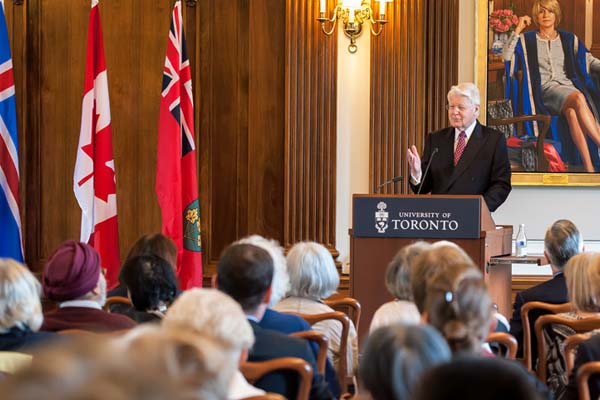
Collaboration key to addressing climate change, President of Iceland tells U of T audience
Published: June 24, 2015
Cooperation and collaboration between nations is necessary to address climate change and the many problems it presents.
That was the message Iceland’s president, Ólafur Ragnar Grímsson, shared at U of T earlier this month.
“We all live in an ice-dependent world,” he said, stressing that weather, crops and economies are fundamentally tied to what happens on our planet.
“The melting of icebergs in our region is causing destruction in China, not in the future years, but in the next months.”
Grímsson said he hopes to see more dialogue on the interaction between ice and people in the Arctic, the Himalayas, and around the world. He shared the message at an event coordinated by Professor Robert Austin of the Munk School of Global Affairs’ Centre for European, Russian and Eurasian Studies.
Austin says he is working to strengthen the University of Toronto's connections with the Nordic region.
“To hear what Iceland says about the arctic is extremely important,” said Austin. “The role of the arctic, the welfare model, prices of oil and gas, they’re all there in that region, and students have an interest – it just needs to be part of the conversation and teaching on this topic.”
U of T students can currently study abroad in Nordic countries through exchange programs with Denmark, Finland, Norway and Sweden. But Austin says he hopes to introduce more learning opportunities about the region next fall, with a proposal for two new graduate courses that will more fully explore the 'Nordic Five' countries (Denmark, Finland, Iceland, Norway and Sweden).
“We don’t talk a lot about the ‘Nordic Five,’ but we need to ramp up conversation on this region,” he said.
The proposed courses will look at the welfare state model, economies, contemporary politics and social issues in the Nordic region.
U of T’s current ties with Iceland include 137 publications authored by U of T researchers and their Icelandic colleagues between 2009-2014, with topics ranging from genetics heredity, operations research management science, environmental sciences, rheumatology, and oncology, among other fields.
Sam Beaird, a Master’s student of European, Russian and Eurasian studies at U of T, spent a year at Sweden's Lund University in the fall of 2014 as part of an exchange program through the Centre for International Experience. While studying at Lund, Beaird researched the Sweden Democrats, a right-leaning party with an anti-immigration stance.
“I was interested in what they think about national minorities. We often have a very positive view of the Nordic countries as a sort of utopia, but there are also domestic problems there that we don’t really know a lot about,” Beaird said.

Beaird says U of T's strong emphasis on international experience drew him to pursue graduate work at the Munk School of Global Affairs. The experience at Lund, he said, allowed him to more deeply examine political issues in Sweden for his Master’s thesis.
Faizan Akbani (pictured left, with President Grímsson) spoke with the Icelandic president at the U of T event.
“I really wanted to meet the President of Iceland. I looked at the topic and I saw that he was a supporter of renewable energy, stopping climate change and tying all that in with the financial situation globally. I wanted to hear his opinion,” said Akbani, who studies mechanical engineering and serves on U of T's Governing Council.
“I asked him whether he feels that renewable energy technology is ready to be implemented instead of oil and gas. He made it clear that this is a reality that we need to face. He is in favour of renewable energy and specifically geothermal energy, and that makes sense to me.”
Climate change previously felt like a faraway problem to Akbani, he said, but hearing Grímsson speak on the topic reframed it as an issue with immediate consequences.
“It was really cool to hear his response. I think he’s a really nice guy.”



